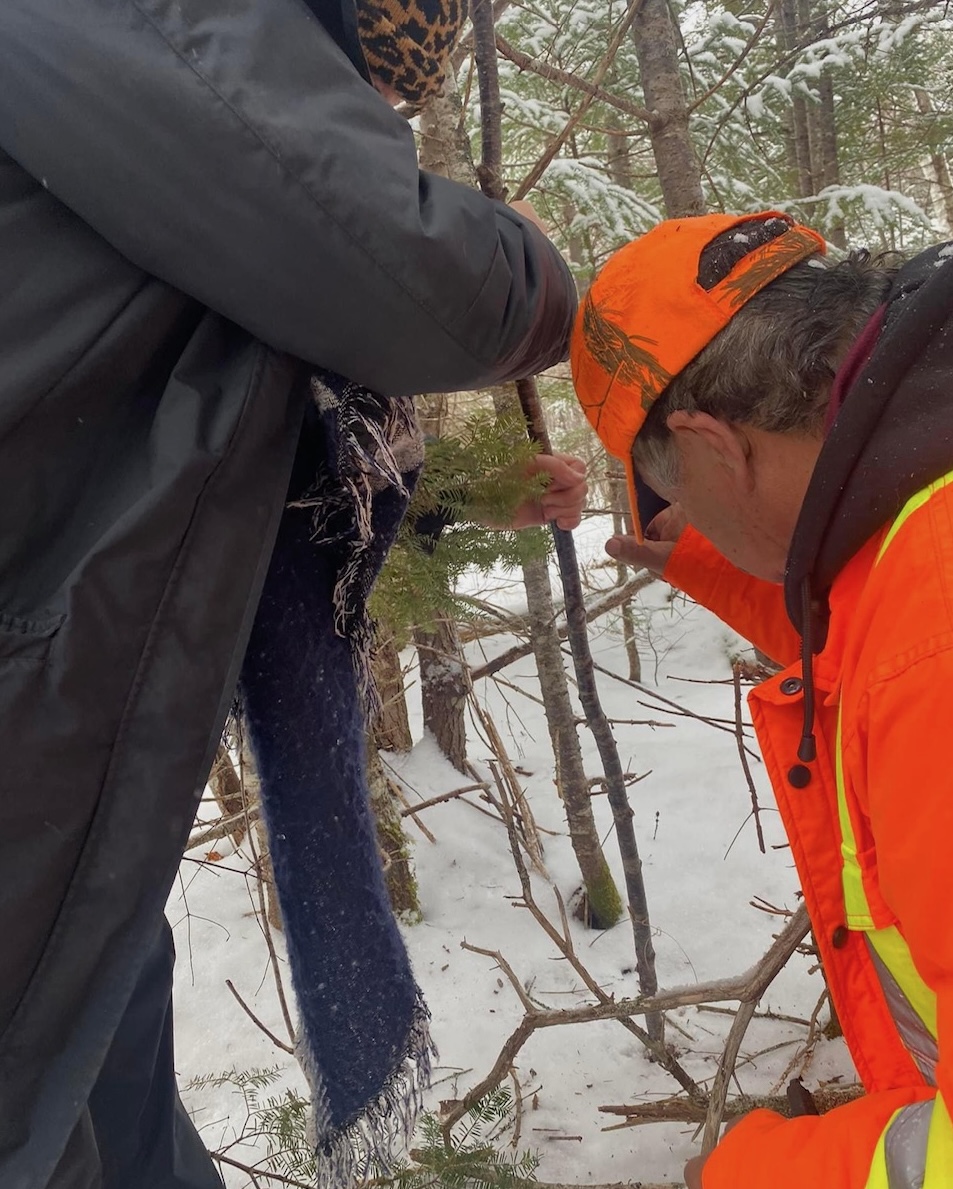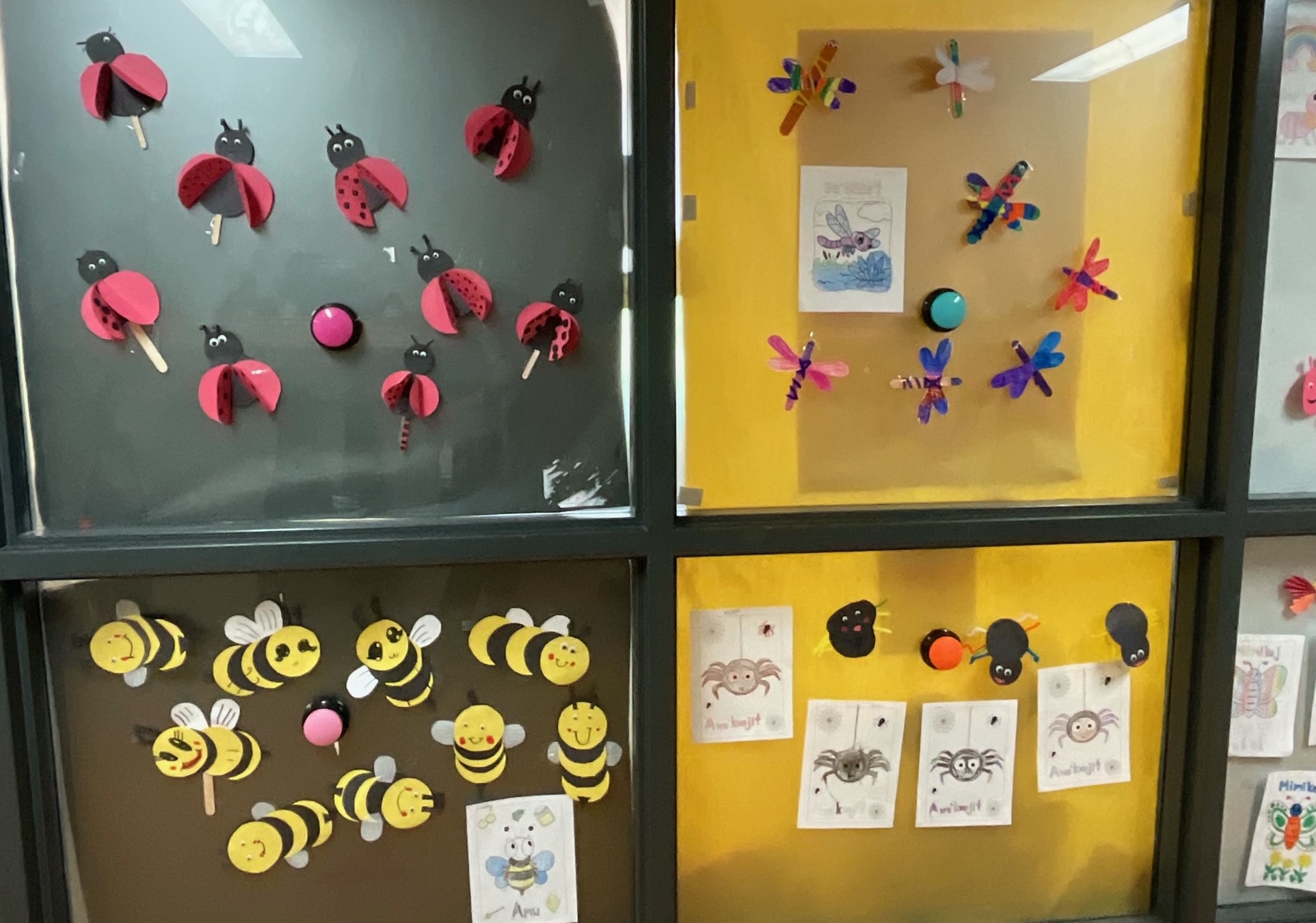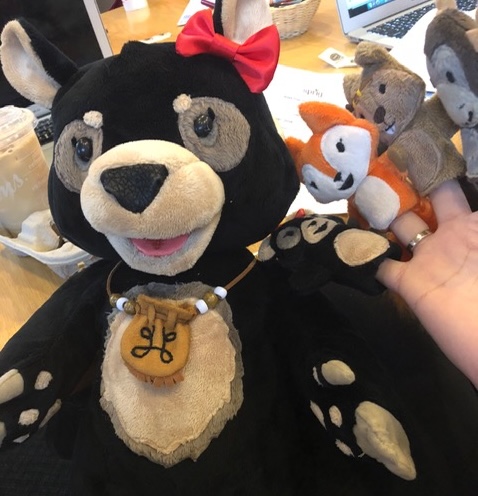Tiffany Gould,
Elementary Teacher
Tiffany Gould is the Mi’kmaw language teacher for grades K-4 at We’koqma’q Mi’kmaw School in Mi’Kma’ki. At the time she spoke about her teaching practice with us, Tiffany taught Mi’kmaw Language Arts, English, and other subjects including land based outdoor education. She has been teaching since the spring of 2014 and she currently teaches on We’koqma’q land in Unama’ki (colonially known as Cape Breton, Nova Scotia). Tiffany says that students at her school are “about 90-95% people within the community,” while some students from neighbouring communities attend because the school is “known for our autism recognition.” Tiffany explained that she feels “very fortunate to live in Cape Breton,” allowing her and others to “bring in guest speakers within the community,” including “elder teachings and traditions that have been lost along the way due to residential schools.” These proximities offer the occasion to celebrate with neighbouring communities in “Powwow Day” where students can play games, such as Waltes, a Mi’kmaq dice game, and connect and gather in joy.

We’koqma’q Mi’kmaw School
We’koqma’q, Mi’kma’ki (Nova Scotia)

Teacher Education
Tiffany emphasized building teacher education into an ongoing community process as teachers practice and learn from students.
One of the learning experiences Tiffany highlighted was a symposium in Edmonton where “Indigenous peoples gathered to connect with the land and how to bring land into learning both in and outside the classroom.” As she discussed, the symposium “sparked a new interest of mine to connect more to the land, not just for myself, but to pass on knowledge that I’ve learned to my students.”
Part of passing on knowledge includes sharing teachings and learnings with others and receiving community input. Tiffany stated, “I studied the four seasons and planned out a yearly chart to follow. The first year, I followed it in grade one and did some notes on how it went and how to improve things. I asked elders and community members on what should go where and when.” She said that “anytime I come across other educators that are interested in land based outdoor education, I’m more than willing to share what I’ve learned.”
As part of sharing her knowledge, Tiffany spoke about Treaty Day. Treaty Day is observed annually in Nova Scotia to commemorate the significance of the Peace and Friendship Treaties between the Mi’kmaq and the British. As Mi’kmaw Kina’matnewey schools are closed on Treaty Day, Tiffany traveled to a school in the Nova Scotia public system to speak to students. She recalled, “I wore my ribbon skirt and talked about what my ribbon skirt represents. We read a story and my daughter and I sang the Honour Song.” Tiffany establishes her practice of community learning within her own communities and others through activities like this.

Teaching & Learning
Tiffany focuses on integrating technology into the classroom for unique pedagogical experiences teaching and learning the Mi’kmaq language.
In her M.Ed., Tiffany notably grew her connection to teaching with and about technology. She discussed how the Atlantic First Nation Tech Services transition to the online learning platform, Seesaw, allowed her mother, or “Ki’ju,” to run weekly activity plans. These would include interactive activities such as “fort building with Ki’ju,” where students would create and discuss their creations using Mi’kmaw words such as ‘pla’kit’ [blanket] or ‘kutputi’ [chair].
For Tiffany, her teaching centres technology by asking “how can I reach these students … and get them engaged?” She highlighted an activity in which she transformed their passion for ‘Pokémon Go’ into a ‘Mi’kmaq Snap’ game for students to bring their learning into the community. As part of the activity, learners would take ‘bird snaps’ of “birds such as: jipji’ik [small birds], kitpu’k [eagles], kloqntiejk [gulls], and ku’ku’kwesk [owls].”
In her new role as K-4 Mi’kmaw language teacher, Tiffany has created an exciting and engaging way of using technology to make learning Mi’kmaw fun. Tiffany’s interactive language wall combines student artwork with buttons that, when pushed, play recordings of students speaking Mi’kmaw words. The interactive wall creates multisensory experiences, which, as Tiffany explained, is essential for connecting with the language. Not only does the interactive wall help students develop their language skills, it also encourages school staff and community visitors to learn Mi’kmaw.
In unique and engaging methods of meeting learners where they are, Tiffany uses technology that connects to youths’ lives and intertwine learning experiences from the classroom and the community. She has led professional development workshops for teachers across Canada to share her creative and innovative teaching strategies, and encourages teachers to “try an idea, don’t be scared of technology, and make it fun!”

Indigenous Knowledges
Tiffany spoke about her Mi’kmaw bear puppet, Aliet, developed alongside Mi’kmaw Kina’matnewey as part of a series of Mi’kmaw puppets introduced in classrooms to connect Indigenous knowledge and curricular content.
Aliet, as Tiffany described, “specializes in math, loves math. She has a whole background story of family dynamics.” All the puppets have “unique stories, family lines, and a little bit about themselves.”
In Tiffany’s previous grade 1 classroom, Aliet and the puppets had “their own centre” in which Aliet and her friends build Mi’kmaw lessons into the learning. Tiffany recounted how Aliet could “play Waltes with the students in the classroom, so that students can find different ways to learn and make math fun.” Additionally, Aliet has artifacts such as a “medicine bag” that interact with the teaching, and favourite colours, “red, black, yellow, and white,” which the children know and incorporate into activities with Aliet. Tiffany said, with “Aliet, we take math outside on the walking trail with medicine sheets.”
Tiffany has transitioned Aliet and her puppet friends into the Mi’kmaw language classroom, where they continue to help students better understand their language and culture. Tiffany appreciates the ways Aliet and the other puppets help connect students to traditional knowledges. As she said, Aliet can be connected to the Mi’kmaq Sky Story, ‘Muin and the Seven Bird Hunters.’ Part of the story, as Tiffany recounted, represents the ways “Indigenous people used to tell of the seasons just looking at the stars.”
In addition to puppets like Aliet, Tiffany includes community members in her classroom as often as possible. Her ki’ju (mother), whose first language is Mi’kmaw, now works in her classroom every day. Tiffany also recently invited a cousin of her family to teach students survival skills, like how to properly clean and traditionally cook fish over a fire. She emphasized that “utilizing the resources you have in your community” is essential for revitalizing Mi’kmaw language, culture, and knowledges.
Not only have Tiffany’s students and community members recognized the tremendous impact her teaching has had on the community, but she was also recently awarded the Prime Minister’s Award for Teaching Excellence, which was awarded to her in person by Prime Minister Justin Trudeau.
Co-created by Tiffany Gould, Rachel Moylan, and Christine Moreau
